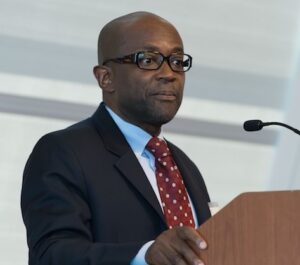[ad_1]

Professor Yaw Nyarkoh, an economist, has called for efforts to make Ghana, a West African economic hub, to drive global investment into the country to spur sustainable development and employment.
Prof Nyarkoh said this when he delivered a speech at the Achimota Speaks forum in Accra on Thursday evening on the theme: “A Country in crisis: Defining a new economic direction.”
He advised the Government to spearhead the agenda with the private sector by boosting the country’s transport infrastructure, including, a reintroduction of a national airline (last operated in 2004), and make ports and road networks efficient.
That, the Professor of Economics at New York University, said, would position Ghana, the Secretariat of the African Continental Free Trade Area (AfCFTA), as the go-to-place for business and trade in West Africa, while connecting the rest of the world.
Citing the United Arab Emirates as an example, he stated that when they gained independence in the early 1971, they decided to make their nation an economic hub, by capitalizing on the Emirates airline.
“The Emirates airline has now become a national airline for Africa; if you want to go from Angola to Ghana, you’d have to pass through Dubai, from Ghana to Kenya you would have to pass through Dubai. Ghana should be doing the same thing,” he said.
“When this happens, you will have some people leaving in United States of America (USA) who would decide to work in Kenya, using Ghana as a base, and people can even set up their businesses in the country through electronic and digital means,” he explained.
He said the economic hub effort, required structural changes in the Ghanaian economy, by being keen on introducing technology in land rights and tenure systems, expanding warehousing, and increasing access to market of farm products.
“The country needs to go back to the ground and transform things. We should rebuild our farms and firms, and make Ghana an exporter of grains,” he recommended.
Prof Nyarkoh stated that some sacrifices ought to be made to make the tourism sector vibrant, which would make many businesses find comfort in setting up in the country, knowing there were wonderful hotels and places of relaxation.
“What’s wrong with allowing US citizens coming here without a visa, despite the fact that when we’re going there, they give us a lot of grief?” He asked, while encouraging the government to make visas easily accessible to businesses and people across the world.
On the 2024 budget, the Economist said, “listening to the budget presented by the Finance Minister, you realise that the government is pre-occupied with macroeconomic numbers, which doesn’t help in the developments of the country.”
“Sometimes the numbers just fly by… what do they mean by 1.5 per cent vrs 1.7, per cent. If you are in the Ministry of Finance, it is important, but if you are looking for the development of Ghana, then we must go back to our microeconomics,” he said.
He was confident that Ghana could be a major economic hub, connecting people and business across the world, should government work more closely with the private sector to enhance value addition production in agric, tourism, and education.
That was because the country was endowed with many natural advantages, including being an English-speaking country, and only needed to be exploited in Ghana’s favour.
“For example, we speak English. My friends in Angola are trying to change their way from Portuguese to English, but how many nations train in Portuguese? He quizzed.
Source: GNA
[ad_2]
Source link
